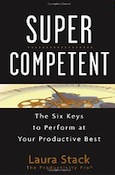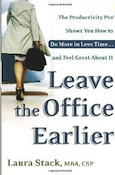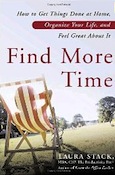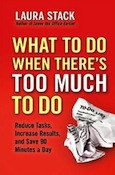Reduce the Unimportant to Maximize Your Productivity at Work | Laura Stack, Productivity Expert
Quotes:
“Getting your house in order and reducing the confusion gives you more control over your life. Personal organization…frees you to operate more effectively.” — Larry King, American journalist.
“Civilization is the process of reducing the infinite to the finite.” — Oliver Wendell Holms, American writer and physician.
“Efficiency is doing things right; effectiveness is doing the right things.” — Peter F. Drucker, Austrian management guru.
In their secret hearts, most workers believe that in order to maximize their productive potential—and especially to shine in the eyes of their superiors—they have to work like dogs. This seems like common sense; but as Will Rogers taught us years ago, “Common sense ain’t so common.” And in any case, this little nugget of wisdom happens to be Wrong, with a capital W, says Laura Stack, Productivity Expert
True workplace productivity stems not from exhausting yourself with overwork, but from chopping away the unnecessary, clearing sneaky timewasters from your schedule, refusing to accept work that doesn’t belong to you, and focusing on what truly matters to you and your organization. What better way to shine? In my latest book, What To Do When There’s Too Much To Do (Berrett-Koehler Publishers, June 2012), I describe exactly how do all this, based on my Productivity Workflow Formula™ (PWF).
In the past, I’ve blogged about numerous things to stop doing at work: for example, complaining, gossiping, skipping breaks, and multitasking. Other timewasters I’ve advised against include checking mail too often, over-attention to social media, and surfing the Internet. These self-defeating behaviors do nothing but hurt you in the long run. In this blog, I’ll extend the concept to four timewasters that might not be so readily obvious.
Reduce Your Accessibility
An open-door policy may sound like a good thing, but it can quickly become a recipe for non-productivity. If people can enter your office at any time for any reason, then you run the risk of having them randomly divert your focus whenever they want to. It might not seem like such a big deal if they only bother you for five minutes at a time, but then you have to relocate your stopping point and try to get back into your productive trance—something that can take a while. Even if this happens just a few times a day, you can easily lose half an hour’s worth of productivity daily.
Depending on your position in the organization, you may not have the option of shutting yourself off from the rest of the world; and of course, you have to remain open to a certain level of input in order to get your job done. But if possible, when you need to focus, close the door and don’t answer the phone.
You may have experienced the concept of “office hours,” a set period when you have to make yourself available to consult with people. Consider turning the idea inside out by implementing reverse office hours: i.e., a time when you accept no interruptions at all, when you focus like a laser so you can drive your personal productivity higher.
Refuse to Participate in Artificial Crises
Genuine crises are one thing; you have to deal with them as they arise. Artificial crises generated by another person’s poor time management skills represent something else entirely. Just because someone has allowed something to blow up into a crisis for them, that doesn’t mean it automatically becomes a crisis for you.
Why should a co-worker’s priorities derail yours? Just because you’ve been proactive enough to balance your load properly doesn’t mean you suddenly have to take up their slack. When someone frantically tries to rope you into more work, just say no. You have enough of your own to do.
Quit Worrying
A certain level of concern about your work helps you stay sharp, but worrying about it too much can hurt you—if only by agitating you psychologically and diverting your attention from more productive pursuits. It can even have direct physical effects. For example, if you obsess over the next day’s to-do list as you try to fall asleep at night, you might not get all the sleep you need…and your work performance will surely suffer as a result.
Stop worrying so much. Just take steps to get your work done; and if you run into any obstacles, reassess the situation, and take steps to overcome those obstacles.
Know When to Stop
How many times have you found yourself in a meeting that dragged on because someone couldn’t let something go, or you got off on some tangent, or people wanted to socialize? Have you ever checked, rechecked, and re-rechecked a task just to make sure you’ve done it right? Has a 10-minute email session ever stretched into an hour?
Rein in such behavior, or it will steal away your time bit by bit. If you find yourself stuck in a rambling meeting, excuse yourself and leave. Once you’ve edited and spellchecked that report, turn it in. In general, whenever you’ve finished something to the best of your ability, stop working on it and move on to the next thing on your list.
The Upshot
Apply all these factors to your day as part of your standard task triage process, and I guarantee you’ll take back substantial pieces of your time. In combination with the PWF measures I outline in What To Do When There’s Too Much To Do, these can ultimately help you trim your daily schedule by 90 minutes or more.
The idea of maximizing your workplace productivity without killing yourself seems simple enough, but it inevitably proves hard to implement. Achieving this goal requires a consistent, focused, massive application of discipline. So don’t give up. Keep working at reducing the unimportant, and eventually you’ll arrive at a point where you actually have enough time in your life to do something besides work.
For more information or to book Laura Stack to speak at your event, click here.
About Laura Stack
Laura Stack, MBA, CSP, has consulted with Fortune 500 corporations for nearly 20 years in the field of personal productivity. She helps leaders develop high-performance cultures and achieve Maximum Results in Minimum Time® for their employees, teams, and themselves. She is the president of The Productivity Pro®, Inc., which specializes in productivity improvement in high-stress organizations; she is also the 2011-2012 president of the National Speakers Association. Keynoter Laura presents over 100 practical, high-energy keynotes and seminars each year on improving output, lowering stress, and saving time in today’s workplaces and homes. She is one of a handful of professional speakers whose business focuses solely on time management and productivity topics. Laura is a high-energy, high-content speaker, who educates, entertains, and motivates professionals to improve workplace productivity. She has earned the Certified Speaking Professional (CSP) designation, the highest earned designation given by the National Speakers Association (NSA).

Laura is the bestselling author of five books, including What to Do When There’s Too Much to Do: (Berrett-Koehler 2012) SuperCompetent (Wiley, 2010); The Exhaustion Cure (Broadway Books, 2008), Find More Time (Broadway Books, 2006), and the bestselling Leave the Office Earlier (Broadway Books, 2004), which was hailed as “the best of the bunch” by the New York Times. Her books have been published in nine countries and translated into six foreign languages, including Japanese, Korean, Chinese, Taiwanese, Italian, and Romanian.

Widely regarded as one of the leading experts in the field of employee productivity and workplace issues, she has been featured nationally on the CBS Early Show, CNN, NPR, Bloomberg, NBC TV, WB News, the New York Times, USA Today, the Wall Street Journal, the WashingtonPost.com, O Magazine, Entrepreneur, Readers Digest, and Forbes magazine. Laura has been a spokesperson for Microsoft, 3M, Skillsoft, Office Depot, and Xerox, and she is the creator of The Productivity Pro® planner by Day-Timer. Laura is the exclusive productivity partner of Linkage, Inc., which introduces her SUPERCOMPETENT® culture to organizations around the globe.

For more information or to book Laura Stack to speak at your event, click here

